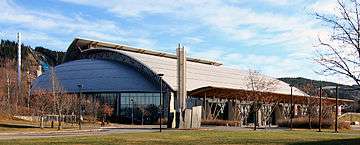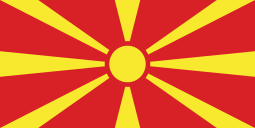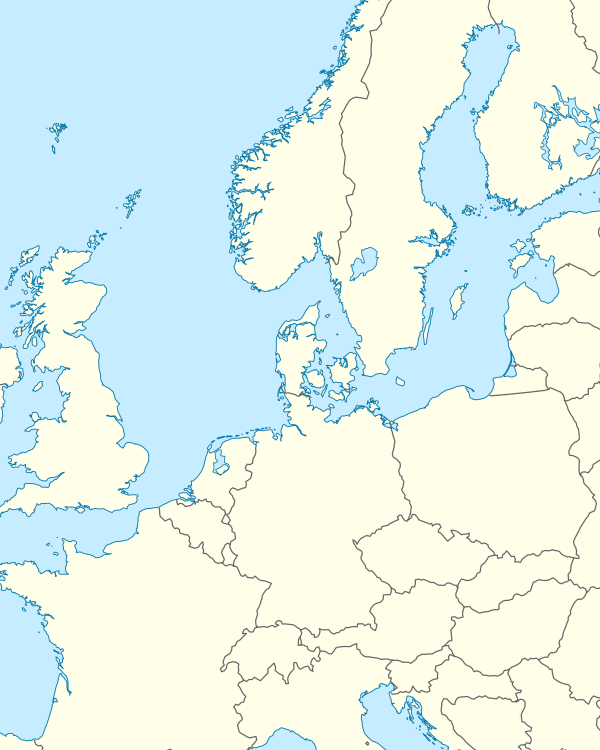Junior Eurovision Song Contest 2004
The Junior Eurovision Song Contest 2004 was the second edition of the annual Junior Eurovision Song Contest for young singers aged 8 to 15. It was held on 20 November 2004, in Håkons Hall, Lillehammer, Norway and lasted 2 hours and 15 minutes. It was presented by Stian Barsnes Simonsen and Nadia Hasnaoui, broadcast in 20 countries and viewed by 100 million people. Eighteen countries participated, France and Switzerland participated for the first time.
| Junior Eurovision Song Contest 2004 | |
|---|---|
 | |
| Dates | |
| Final | 20 November 2004 |
| Host | |
| Venue | Håkons Hall, Lillehammer, Norway |
| Presenter(s) | Stian Barsnes Simonsen Nadia Hasnaoui |
| Directed by | Gitte Calmeyer |
| Executive supervisor | Svante Stockselius |
| Executive producer | Ivar Ragne Jensen |
| Host broadcaster | Norwegian Broadcasting Corporation (NRK) |
| Opening act | Flag parade introducing the 18 participating countries |
| Interval act | Westlife performing "Ain't That a Kick in the Head?" |
| Website | junioreurovision |
| Participants | |
| Number of entries | 18 |
| Debuting countries | |
| Non-returning countries | None |
Participation map
| |
| Vote | |
| Voting system | Each country awards 1–8, 10, and 12 points to their 10 favourite songs |
| Nul points | None |
| Winning song | "Antes muerta que sencilla" |
The contest was won by 9-year-old María Isabel from Spain with her song Antes muerta que sencilla (Better Dead Than Plain). Dino Jelusić, who won the 2003 contest for Croatia, presented the award to María. Since then, María Isabel has entered the charts in not only Spain but France, Italy, Scandinavia, Latin America and released a second album. Greece, who came ninth received more sets of twelve points than the United Kingdom, who came second. France, who came sixth, were voted by all the other countries that took part, which is more than the number of countries that voted for Romania, who came fourth and Croatia, who came third.
Incidentally, the same three countries occupied the top three places as last year, just in a different order. These three countries were Spain, the United Kingdom, and Croatia.
Origins and history
The origins of the contest date back to 2000 when Danmarks Radio held a song contest for Danish children that year and the following year.[1][2] The idea was extended to a Scandinavian song festival in 2002, MGP Nordic, with Denmark, Norway and Sweden as participants.[3][4] The EBU picked up the idea for a song contest featuring children and opened the competition to all EBU member broadcasters making it a pan-European event. The working title of the programme was "Eurovision Song Contest for Children",[5] branded with the name of the EBU's already popular song competition, the Eurovision Song Contest. Denmark was asked to host the first programme after their experience with their own contests and the MGP Nordic.
Location
Host city selection
Norway was the third country of choice for this contest as the European Broadcasting Union (EBU) had originally chosen ITV of the United Kingdom to host the event in Manchester. However, ITV pulled out in May 2004 due to finance and scheduling problems.[6] It is also thought that another factor to their decision was the previous years' audience ratings for ITV which were below the expected amount.[7]
The venue was therefore moved to Croatia, the winning country of 2003,[8] but the Croatian broadcaster HRT reportedly forgot that the prospective venue for the event was already booked for the period the Junior Eurovision Song Contest was to take place.[9] It was at this point, with five months remaining until the event would be held, that Norwegian broadcaster NRK offered to organise the next contest.
Venue

Håkons Hall, sometimes anglicized as Håkon Hall and Haakons Hall, is an arena located at Stampesletta in Lillehammer, Norway, built for the 1994 Winter Olympics. With a spectator capacity of 11,500 people, it is the largest handball and ice hockey venue in the country.
Håkons Hall is regularly used for handball and ice hockey tournaments, concerts, exhibitions, conferences and banquets. The venue is owned by Lillehammer Municipality via the subsidiary Lillehammer Olympiapark, which owns all the Olympic venues in Lillehammer. The Norwegian Olympic Museum is located in the arena, which is located next to the smaller Kristins Hall. The hall was opened on 1 February 1993 having cost 238 million Norwegian krone (NOK).
Format
Visual design
On 2 September 2004, host broadcaster NRK presented the official logo of the contest.[10] The theme of the show was later confirmed as bright Nordic winter nights, sparkling stars and snow crystals, set in a hip-hop atmosphere.[11]
Presenters
On 23 September 2004, it was announced that Nadia Hasnaoui and Stian Barsnes Simonsen would host the contest. The hosting couple also led the final of national qualifying rounds to the competition, Melodi Grand Prix Junior 2004 on 12 June.[12]
Running order
The draw for the running order of the contest was held on 14 October, with Greece drawn to open the contest for a second time and Romania drawn to close.[13]
Voting
All countries used televoting to decide on their top ten. In normal Eurovision fashion, each country's favourite song was given 12 points, their second favourite 10, and their third to tenth favourites were given 8–1 points.
Opening and interval acts
On television, the show opened with the usual EBU ident and fanfare, followed by a placard of a starry night sky with suspensful music and the NRK logo in the middle of the card. The "JESC singing girl" would then zoom into the screen on a snowboard with the JESC 2004 logo on the bottom, and trailing behind the board would be stars. The singing girl would then hover towards a rotating disco ball, and as the camera would move closer, the words "JUNIOR EUROVISION SONG CONTEST - LILLEHAMMER 2004" would also start rotating. During this time, a person would start rapping the word "JESC" over and over again, then the placard would give way to a ceiling shot of the arena.
After the flag parade, the hosts, Stian and Nadia were to land on the stage from a snowboard. Stian landed on the left hand side of the stage, but when Nadia came through, she 'accidentally' crash-landed behind the stage. She emerged a few minutes later in comedic style coughing, but no bodily injuries were seen. Nonetheless, when she came out, the audience continued cheering and the show proceeded like it was supposed to.
The camera angle would then switch, this time to a camera positioned in the audience of the arena, where all the participants would walk through in a first ever Eurovision-related flag parade. In future editions, the flag parade would occur on the stage of the arena.
During a ten-minute break for televoting,[14] boy band Westlife performed "Ain't That a Kick in the Head?" live on stage as the interval act.[15]
Participating countries
Originally twenty countries had applied to take part but Germany and Israel later pulled out.[16] There were also reports that Ireland had planned to enter the programme.[17] Israel and Ireland would later debut in the contest in 2012 and 2015, respectively. Germany still hasn't made their debut yet.
This was the last contest that Poland and France took part in before their withdrawal in 2005. They would miss the contest for 12 and 14 years until 2016 and 2018 respectively, when they announced their return.[18]
Results
| Draw | Country | Artist | Song | Language | Place | Points |
|---|---|---|---|---|---|---|
| 01 | Secret Band | "O palios mou eaftos" (Ο παλιός μου εαυτός) | Greek | 9 | 48 | |
| 02 | Young Talent Team | "Power of a Song" | English | 12 | 14 | |
| 03 | Klaartje & Nicky | "Hij is een kei" | Dutch | 11 | 27 | |
| 04 | Demis Mirarchi | "Birichino" | Italian | 16 | 4 | |
| 05 | @lek | "En stjerne skal jeg bli" | Norwegian | 13 | 12 | |
| 06 | Thomas Pontier | "Si on voulait bien" | French | 6 | 78 | |
| 07 | Martina Siljanovska | "Zabava" (Забава) | Macedonian | 7 | 64 | |
| 08 | KWADro | "Łap życie" | Polish | 17 | 3 | |
| 09 | Marios Tofi | "Onira" (Όνειρα) | Greek | 8 | 61 | |
| 10 | Egor Volchek | "Spiavajcie so mnoj" (Спявайце со мной) | Belarusian | 14 | 9 | |
| 11 | Nika Turković | "Hej mali" | Croatian | 3 | 126 | |
| 12 | Mārtiņš Tālbergs and C-Stones Juniors | "Balts vai melns" | Latvian | 17 | 3 | |
| 13 | Cory Spedding | "The Best Is Yet to Come" | English | 2 | 140 | |
| 14 | Cool Kids | "Pigen er min" | Danish | 5 | 116 | |
| 15 | María Isabel | "Antes muerta que sencilla" | Spanish | 1 | 171 | |
| 16 | Limelights | "Varför jag?" | Swedish | 15 | 8 | |
| 17 | Free Spirits | "Accroche-toi" | French | 10 | 37 | |
| 18 | Noni Răzvan Ene | "Îți mulțumesc" | Romanian | 4 | 123 | |
Scoreboard
| Results | ||||||||||||||||||||
|---|---|---|---|---|---|---|---|---|---|---|---|---|---|---|---|---|---|---|---|---|
| Greece | 48 | 12 | 1 | 2 | 1 | 3 | 12 | 3 | 5 | 1 | 2 | 6 | ||||||||
| Malta | 14 | 2 | 3 | 4 | 4 | 1 | ||||||||||||||
| Netherlands | 27 | 3 | 3 | 1 | 1 | 3 | 1 | 5 | 2 | 1 | 7 | |||||||||
| Switzerland | 4 | 4 | ||||||||||||||||||
| Norway | 12 | 7 | 5 | |||||||||||||||||
| France | 78 | 6 | 1 | 5 | 6 | 2 | 2 | 4 | 4 | 6 | 4 | 7 | 2 | 6 | 8 | 4 | 8 | 3 | ||
| Macedonia | 64 | 6 | 6 | 5 | 5 | 4 | 5 | 3 | 8 | 3 | 3 | 5 | 3 | 3 | 3 | 2 | ||||
| Poland | 3 | 2 | 1 | |||||||||||||||||
| Cyprus | 61 | 12 | 8 | 3 | 1 | 6 | 4 | 5 | 2 | 8 | 1 | 5 | 1 | 5 | ||||||
| Belarus | 9 | 1 | 3 | 1 | 4 | |||||||||||||||
| Croatia | 126 | 4 | 8 | 8 | 10 | 8 | 12 | 7 | 6 | 8 | 8 | 12 | 8 | 6 | 8 | 6 | 7 | |||
| Latvia | 3 | 2 | 1 | |||||||||||||||||
| United Kingdom | 140 | 5 | 10 | 12 | 7 | 6 | 6 | 5 | 10 | 5 | 10 | 7 | 10 | 10 | 10 | 7 | 10 | 10 | ||
| Denmark | 116 | 7 | 5 | 7 | 3 | 12 | 5 | 8 | 8 | 7 | 5 | 6 | 4 | 10 | 7 | 10 | 4 | 8 | ||
| Spain | 171 | 10 | 7 | 10 | 12 | 8 | 12 | 10 | 12 | 10 | 7 | 12 | 6 | 7 | 12 | 12 | 12 | 12 | ||
| Sweden | 8 | 4 | 1 | 3 | ||||||||||||||||
| Belgium | 37 | 3 | 4 | 4 | 7 | 4 | 2 | 2 | 2 | 2 | 1 | 4 | 2 | |||||||
| Romania | 123 | 8 | 2 | 10 | 7 | 10 | 7 | 6 | 8 | 12 | 10 | 12 | 6 | 2 | 12 | 6 | 5 | |||
12 points
Below is a summary of the maximum 12 points each country awarded to another:
| N. | Contestant | Voting nation |
|---|---|---|
| 8 | Spain | Belgium, Croatia, Denmark, France, Poland, Romania, Sweden, Switzerland |
| 3 | Romania | Belarus, Latvia, Spain |
| 2 | Croatia | Macedonia, United Kingdom |
| Greece | Cyprus, Malta | |
| 1 | Cyprus | Greece |
| Denmark | Norway | |
| United Kingdom | Netherlands |
International broadcasts and voting
Voting and spokespersons
.svg.png)
.svg.png)
.svg.png)















Commentators
Participating countries
.svg.png)
.svg.png)

.svg.png)














Other countries
For a country to be eligible for potential participation in the Junior Eurovision Song Contest, it needs to be an active member of the EBU. It is currently unknown whether the EBU issue invitations of participation to all 56 active members like they do for the Eurovision Song Contest.



Official album
| Junior Eurovision Song Contest: Lillehammer 2004 | ||||
|---|---|---|---|---|
 | ||||
| Compilation album by | ||||
| Released | November 2004 | |||
| Genre | Pop | |||
| Length | 43:51 | |||
| Label | Universal | |||
| Junior Eurovision Song Contest chronology | ||||
| ||||
Junior Eurovision Song Contest: Lillehammer 2004, is a compilation album put together by the European Broadcasting Union, and was released by Universal Music Group on November 2004. The album features all the songs from the 2004 contest.
| No. | Title | Artist | Length |
|---|---|---|---|
| 1. | "O palios mou eaftos" | Secret Band (Greece) | 2:42 |
| 2. | "Power of a Song" | Young Talent Team (Malta) | 2:36 |
| 3. | "Hij is een kei" | Klaartje & Nicky (Netherlands) | 2:45 |
| 4. | "Birichino" | Demis Mirarchi (Switzerland) | 2:45 |
| 5. | "En stjerne skal jeg bli" | @lek (Norway) | 2:46 |
| 6. | "Si on voulait bien" | Thomas Pontier (France) | 2:33 |
| 7. | "Zabava" | Martina Smiljanovska (Macedonia) | 2:44 |
| 8. | "Łap życie" | KWADro (Poland) | 2:42 |
| 9. | "Oneira" | Marios Tofi (Cyprus) | 2:40 |
| 10. | "Spiavajcie so mnoj" | Egor Volchek (Belarus) | 2:39 |
| 11. | "Hej mali" | Nika Turković (Croatia) | 2:42 |
| 12. | "Balts vai melns" | Mārtiņš Tālbergs & C-Stones Juniors (Latvia) | 2:45 |
| 13. | "The Best Is Yet to Come" | Cory Spedding (United Kingdom) | 2:39 |
| 14. | "Pigen er min" | Cool Kids (Denmark) | 2:47 |
| 15. | "Antes muerta que sencilla" | María Isabel (Spain) | 2:32 |
| 16. | "Varför jag?" | Limelights (Sweden) | 2:47 |
| 17. | "Accroche-toi" | Free Spirits (Belgium) | 2:45 |
| 18. | "Îți mulțumesc" | Noni Răzvan Ene (Romania) | 2:42 |
| Total length: | 43:51 | ||
References
- "IMDB: Børne1'erens melodi grand prix 2000". IMDb. 1 May 2000. Retrieved 3 May 2008.
- "IMDB: de unges melodi grand prix 2001". IMDb. 1 May 2001. Retrieved 3 May 2008.
- "IMDB: MGP Nordic 2002". IMDb. 1 December 2002. Retrieved 3 May 2008.
- "MGP Nordic 2002". esconnet.dk (in Danish). 27 April 2002. Archived from the original on 25 October 2007. Retrieved 3 May 2008.
- "First EBU press release on JESC 2003". European Broadcasting Union. 22 November 2002. Archived from the original on 5 September 2006. Retrieved 3 May 2008.
- "'Junior contest not to take place in Manchester.'".
- Cozens, Claire (17 November 2003). "JESC UK ratings". The Guardian. London. Retrieved 3 May 2008.
- "Junior 2004 in Croatia! (update)". 5 September 2004. Archived from the original on 5 September 2004. Retrieved 26 June 2019.
- "Junior contest moves to Norway". 16 November 2004. Archived from the original on 16 November 2004. Retrieved 26 June 2019.
- "NRK revealed Junior 2004 logo". ESCToday.com. 2 September 2004. Retrieved 30 March 2020.
- "Junior theme: 'bright Nordic winter nights'". ESCToday.com. 14 October 2004. Retrieved 30 March 2020.
- "Nadia and Stian to host Junior 2004". ESCToday.com. 23 September 2004. Retrieved 30 March 2020.
- "Junior: this is the running order…". ESCToday.com. 14 October 2004. Retrieved 30 March 2020.
- "Tonight in Lillehammer: 10 minutes televoting". ESCToday.com. 20 November 2004. Retrieved 30 March 2020.
- "Boyband Westlife to perform at Junior 2004". ESCToday.com. 3 November 2004. Retrieved 30 March 2020.
- "'Germany withdraws from Junior Eurovision Song Contest'". Archived from the original on 28 June 2008.
- "Information on Irish plans to participate". Archived from the original on 16 November 2004. Retrieved 26 June 2019.
- Granger, Anthony (3 July 2016). "Poland returns to the Junior Eurovision Song Contest". Eurovoix.
- "Šodien Lillehammerē notiek otrais Eirovīzijas bērnu dziesmu konkursa fināls". delfi.tv. 20 November 2004. Retrieved 29 July 2018.
- "Junior Eurovision Song Contest". UKGameshows. Retrieved 12 August 2012.
- "Laste Eurovisiooni lauluvõistluse võit läks Hispaaniasse". Eesti Päevaleht. 22 November 2004. Retrieved 2 June 2020.
External links
| Wikimedia Commons has media related to Junior Eurovision Song Contest 2004. |


